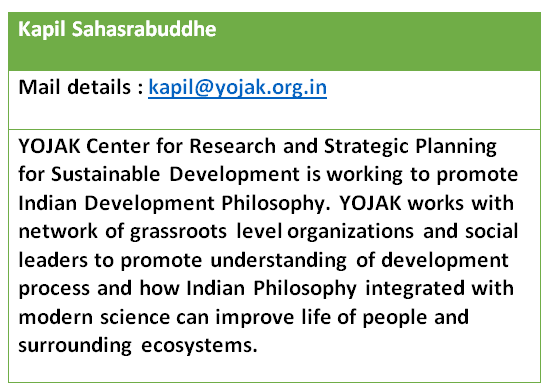Towards Seed reliance – walking the path of Antyoday
25 Mar 2020 15:02:59
Seed reliance; It is during the childhood days that we used to laugh on a joke- If asked a boy in city that who he thinks gives him milk, he would say, “Bhaiyya or Dairy”. Today if you ask a boy from a village – where he thinks he gets seeds for farming, he answers, “from the shop”. But the situation is quite different in Mayali, a small village from Tapi district in Gujarat, as the farmers here grow their seeds on their own. Also they share those with other farmers. This is something different I noticed in 2018 when I first visited this village.
Promoting seed culture
Dr. Ambedkar Vanvasi Kalyan Trust was working in Tapi and Dang district of Gujarat to promote sustainable agriculture practices for last decade or so. They participated in a study program called ‘Madhya Bahrat Vananchal Samrudhi Yojana’ promoted by YOJAK in 2013-15. In the process, they studied availability of seeds, local seeds, university efforts, seed production system, seed trade etc. It was an eye-opening exercise for trust as well as villagers who participated in the process. Key learning was seed purchase and ever increasing amount spent by farmers on the same. Trust also realized that Agriculture Universities has done excellent work to produce good improved varieties. But those varieties are not available for various reasons.
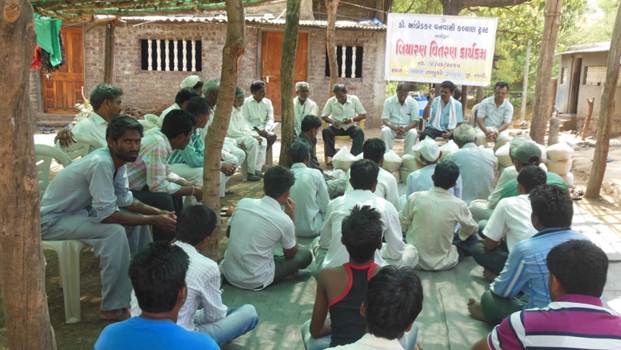
Trust decided to promote university developed improved varieties in both the districts. Many a time, seed promotion resulted into just replacement of existing varieties with improved varieties. Farmer still depended on seed availability for external agency. Trust decided to promote seed production by local farmers. It mobilized people, took awareness camps, and formed village level Khedut Mandali to undertake activities. Navsari Agriculture University and KVK’s from both the districts provided much needed technical support in seed production and training of farmers. After 2-3 years of efforts, trust was able to convince few villages and successfully started seed production. From 2016 to 2019 more than 8000 farmers in Dang and Tapi districts were benefitted from this process and reduced seed purchase expenses. Also, they have seeds secured for next few years which is an important aspect in line to food security.
Similarly, in Nandurbar, Dr. Hedgewar Seva Samiti promoted seed production of local food crops viz Rice, Jowar, Tur etc as well as cash crops like onion. Farmers formed groups, produced seed and sold seeds in the vicinity of 30 villages. They took responsibility of seed quality. Now they are busy organizing this effort into institutional model where onion seed production is undertaken with help of Directorate of Onion and Garlic Research and with 100% buy back model.
Seed in Indian context
Seed is an important aspect of input. Good quality seed ensures good production in optimum situation. India has long history of seed innovation and production. It was said that in the beginning of 20th century, India had more than 2 lakh varieties of Rice. Similar situation was prevailed with diversity of varieties in other crops. Similarly, there was a robust decentralized system of seed production across country. Each farm was a laboratory and farmers used to develop seed varieties based on their experiences. In remote tribal areas, systems were in place to produce, harvest, store seeds. Knowledge associated with seeds were available across country. Systems were in place to transfer this knowledge to next generation. Dr. Richaria’s research of such Indian systems for Rice and documentation by Agri-History foundation, Hyderabad is eye opening.
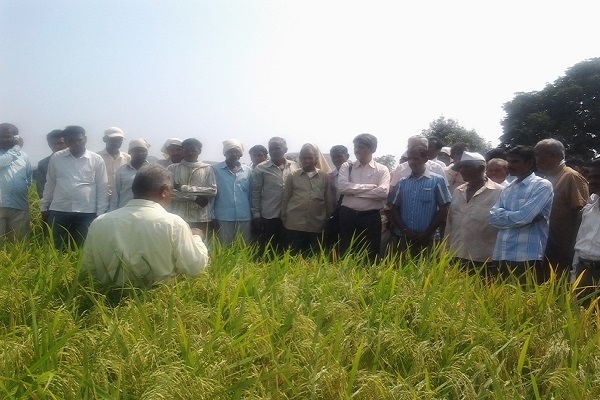
During British era, we lost faith in our knowledge and systems. Western thinking of production and utilization was imposed. Industrial revolution and change in perspective of development in policy makers has changed entire thinking system in our country. Top down approach and socialist model led to higher dependence on government.
In 1970’s, Food security concern led to Green Revolution. Today’s crop produce availability numbers are product of that process. Green revolution promoted high yielding varieties, fertilizers, pesticides, mechanization etc. Most of these efforts were based on experiences of western countries where situation was very different than India. Still we went ahead to solve perceived problem of food security. Unfortunately, while addressing one concern, we could not realize its impact on other associated areas. So, we are now facing issue of soil deterioration, water pollution, decrease in water availability, external dependency on seed and productivity stagnancy etc. This has led to increase in input costs in many folds.
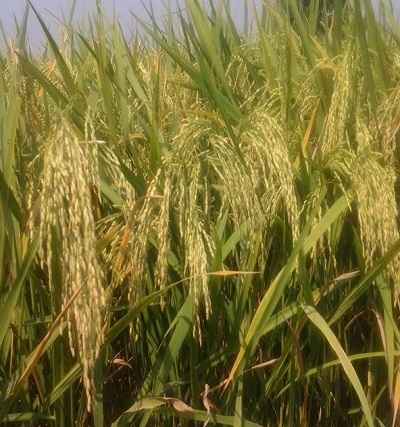
After breakdown of this model, we jumped to privatization in every aspect. Today our entire agriculture is dependent on private companies. Eg. Dang is one of the poorest districts in country. In this district, more than 90% farmers are purchasing rice seeds from private companies. Monetary value of this purchase is in few crores. With such seeds, farmer need to use other inputs which also need to purchase from outside. Even use of these chemical inputs are leading to new problems of loss of soil fertility, water pollution etc. Unfortunately, we are not learning from our mistakes in Green revolution. We are repeating similar mistakes by promoting external input based Genetically Modified Seed system model. Our farmer got trapped into this external input cost cycle and indebted forever.
Systemic issues
Contrary to above situation, good research of our own agriculture universities is not available to farmers. Take example of seed. Every agriculture university in India has developed improved varieties of different crops. Improved varieties are generally selected and improvised from traditional varieties. These improved varieties can be produced by common farmers and use for 3-5 years. On contrary, every year farmer needs to purchase seeds if one uses hybrid varieties.
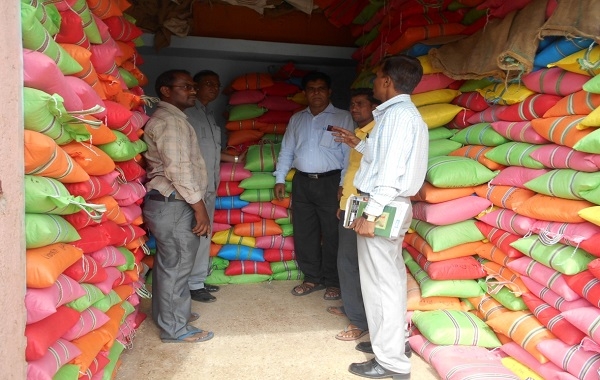
But there are many systemic limitations in reaching of improved varieties to farmers. There are problems in enough production of improved variety seeds, its marketing, legal issues in sale, lack of feedback system etc. Whereas organized private sector has developed systems – from production to door step delivery. Just to share an example – in the study of Dang it was realized that, improved varieties of university were available in packs of 30 kg, that only at district level, whereas companies were selling in each haat and major bazar with even 500 gm packets. Dang is hilly region with very undulating terrain and villages are situated in remote forest areas. Average land holding in Dangs is less than a acre and farmer need smaller quantity of seeds!!!
Towards Seed reliance – walking the path of Antyoday
We need to walk long way in this seed sovereignty road. Above examples are some primary initiatives. It shows that seed security is possible by integrating research, extension and community initiatives. There are similar efforts in other parts of country. There is need for community movement to adopt these models as per local situation. Policy changes along with programmatic support is required to sustain such changes. Farmer producer organizations is one such mechanism which is being promoted for farmer upliftment. It is great tool to link farmers and university and set up area specific seed production companies. Universities can provide technical support; NGOs can hand hold FPOs for few years and farmers can start their own system for seed production. Local market is readily available for such companies. Similarly, such companies can also produce organic input materials.
Antyoday is a concept of upbringing last person in social order. In Ekatma Manav Darshan, Pandit Deendayal Upadhyay discuss this concept while providing various ‘Sutras’ of Indian Development Philosophy. One of the key sutras is ‘Community should steer its development. Governments role is to support in every possible way’. Seed production and control by community with support from government and other stakeholders is a tool to realize Antyodaya in predominantly agriculture driven country like India.
